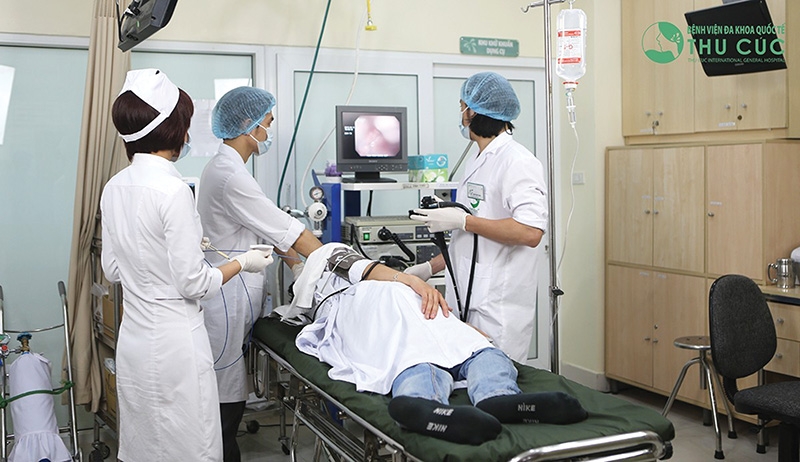Cash injections for private hospitals
 |
| Thu Cuc International General Hospital has received over $26 million from VinaCapital |
Last week, VinaCapital announced that its flagship fund, the Vietnam Opportunity Fund (VOF), had invested in Thu Cuc International General Hospital (TCI) in Hanoi. VinaCapital led a consortium to invest $26.7 million to obtain a significant minority stake along with a board seat at the healthcare provider.
TCI was established in 2011 in one of most populous and rapidly-developing areas of Hanoi by Nguyen Thu Cuc, who in 1996 became the first woman to launch and operate a private healthcare company in northern Vietnam. By working with some of the country’s most experienced doctors, Cuc quickly established TCI as a trusted destination for high-quality services at affordable prices in the fields of obstetrics, gynaecology, and oncology, while also offering comprehensive health checks.
Andy Ho, chief investment officer at VinaCapital said, “TCI is widely recognised as one of the top private hospitals in Hanoi – a position it reached in a relatively short amount of time. That speaks to the vision and focus of the founder, the dedicated and professional medical staff, and the high-quality care they provide.”
As Vietnam’s middle class continues to expand, consumers are seeking greater access to private medical services, thereby relieving the burden on the public health sector. As one of the first investors in the private healthcare industry in Vietnam dating back to its investment in Hoan My in 2009, VOF has long recognised the enormous growth potential of this industry.
“TCI joins our existing healthcare portfolio of Thai Hoa in the Mekong Delta region, and Tam Tri Medical Corporation, which has hospitals in southern and central Vietnam. This investment in TCI will raise the VOF portfolio’s exposure to the healthcare and pharmaceutical sectors to 8 per cent of net asset value and will position VOF as the leading private equity investor in private hospitals and clinics in Vietnam,” Ho added.
Similarly, Hoang Quan Group Co., Ltd. under Hoang Quan Group has recently inked a deal with Medika Investment Vietnam to develop international hospital chains in the country. In the first phase, the two plan to develop 12 international-standard hospitals with 2,500 beds as well as polyclinics with total investment capital of VND6 trillion ($260 million).
Hoang Quan Group is specialising in real estate development with several social housing projects in Vietnam. This time, the company decided to venture into the new field of hospital development to tap into the market’s growth potential.
The group owns a large reserve of land across many localities and will thus be responsible for legal land procedures and project development. Meanwhile, Medika has extensive experience in building and operating hospitals. The company will be in charge of building and managing the system of hospitals. Both groups aim to complete the development of the 12 hospitals and polyclinics in the next five years.
Back in February, British Real Capital London launched the $156 million Hong Anh Medical Campus project in Ho Chi Minh City.The facility is a state-of-the-art healthcare system incorporating a 462-bed hospital, a medical training centre, a network of general practice clinics and pharmacies, and senior residencies and nursing homes, adding much needed facilities and services to Vietnam’s healthcare system. The project is divided into four stages, with the final phase expected to be completed by 2030.
Generally, fresh funds are injected into Vietnam’s private healthcare sector. The Private Equity in Vietnam 2019 report by Grant Thornton shows that healthcare and pharmaceuticals ranked fourth in terms of industry attractiveness for investors, which was voted by 29.2 per cent of participants as “most attractive”.
Eng Aik Meng, chairman of the Singapore-Vietnam Cancer Centre in Ho Chi Minh City is also upbeat about the outlook of Vietnam’s private healthcare sector and forecast much room for private healthcare providers to operate in the country.
“Vietnam’s population is ageing quickly, with more than 10 per cent of the population at or above the age of 60 in 2017 – and in 15–20 years, the elderly will account for one third of the total population. Moreover, the rapid urbanisation is stimulating demand for quality healthcare within the country, and overcrowding in government hospitals is expected to intensify, resulting in long wait times and a shortage of beds,” he said, noting that all the factors will drive the investment wave into Vietnam’s private healthcare sector in the future.
What the stars mean:
★ Poor ★ ★ Promising ★★★ Good ★★★★ Very good ★★★★★ Exceptional
 Tag:
Tag:
Related Contents
Latest News
More News
- Hermes joins Long Thanh cargo terminal development (February 04, 2026 | 15:59)
- SCG enhances production and distribution in Vietnam (February 04, 2026 | 08:00)
- UNIVACCO strengthens Asia expansion with Vietnam facility (February 03, 2026 | 08:00)
- Cai Mep Ha Port project wins approval with $1.95bn investment (February 02, 2026 | 16:17)
- Repositioning Vietnam in Asia’s manufacturing race (February 02, 2026 | 16:00)
- Manufacturing growth remains solid in early 2026 (February 02, 2026 | 15:28)
- Navigating venture capital trends across the continent (February 02, 2026 | 14:00)
- Motivations to achieve high growth (February 02, 2026 | 11:00)
- Capacity and regulations among British areas of expertise in IFCs (February 02, 2026 | 09:09)
- Transition underway in German investment across Vietnam (February 02, 2026 | 08:00)






















 Mobile Version
Mobile Version